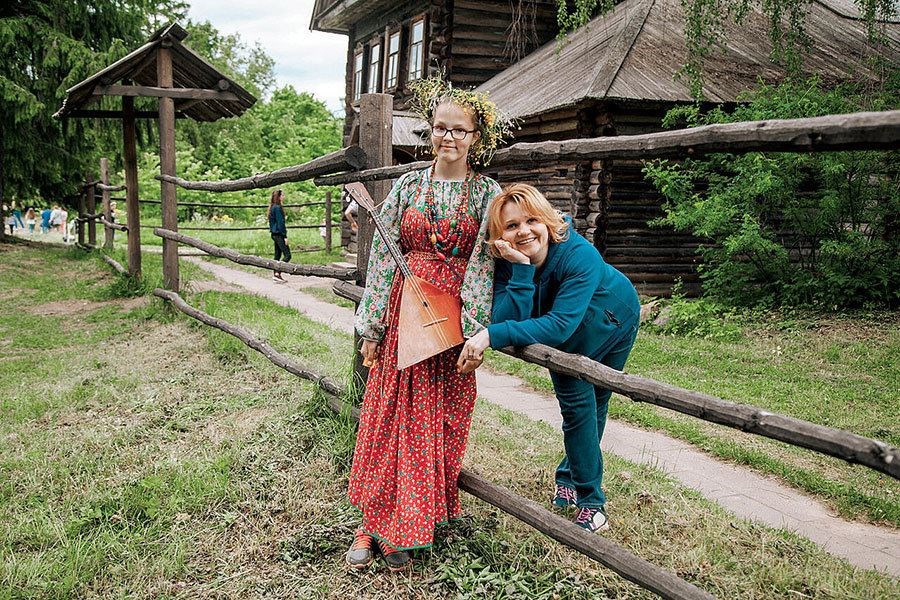Reprinted with permission from The Christian Science Monitor
Torzhok is experiencing a resurgence because of one woman’s activism.
DECEMBER 31, 2018 - TORZHOK, RUSSIA - In this week’s Monitor, we put a twist on the typical year-end wrap-up story. We skip around the globe to look at seven trends worth following. They probably aren’t the ones you’ll read in other publications, but we’re OK with that. After all, the Monitor is about introducing you to things burbling below the surface that bespeak big change but might not be headline news – yet. The war against drugs in Mexico and women’s rights in China and climate change battles in Canada – which are some of trends we cover – all fit that bill.
 Tatiana Sokolova (r.) at the open-air Museum of Russian Wooden architecture near Torzhok, Russia.Tatiana SokolovaYet I found what might seem the smallest and least relevant of the trends to actually be the biggest and most universal, in some ways. It’s by our wonderful Russia correspondent, Fred Weir, and it’s about a tiny town somewhere in the wilderness between Moscow and St. Petersburg that, until recently, even the Russian train system had forgotten. Why in the name of Mikhail Baryshnikov would the Monitor say the fate of poor little Torzhok is one of the trends most worth watching?
Tatiana Sokolova (r.) at the open-air Museum of Russian Wooden architecture near Torzhok, Russia.Tatiana SokolovaYet I found what might seem the smallest and least relevant of the trends to actually be the biggest and most universal, in some ways. It’s by our wonderful Russia correspondent, Fred Weir, and it’s about a tiny town somewhere in the wilderness between Moscow and St. Petersburg that, until recently, even the Russian train system had forgotten. Why in the name of Mikhail Baryshnikov would the Monitor say the fate of poor little Torzhok is one of the trends most worth watching?
The answer begins with the reason that Fred highlights most clearly: Torzhok is experiencing a resurgence because of one woman’s activism. In many parts of the world, that previous sentence would be unremarkable. In Russia, it is revolutionary. Civic activism is still a fairly new concept in Russia. Generations of patriarchal and oppressive government have undermined the idea that someone can have both the ability and the freedom to effect change.
The story of Tatiana Sokolova is really the story of the small shoots of opportunity growing in Russia today. And if anything is going to help Russia realize its full potential, that will. The story reveals the seed of a new and better Russia.
But it also reveals something else. It reveals something about all of us.
Before Ms. Sokolova intervened, why had Torzhok been forgotten? The simplest answer is that it had grown mentally stale. In this case, Fred writes, a deep-seated cultural pessimism was mostly to blame. The result, he writes, was a torpor that “led many local people to greet any fresh ideas with traditional apathy, pessimism, and suspicion.”
The people, Sokolova told Fred, were living in their own stereotypes, talking about how hopeless everything was. They had been conditioned to expect the worst.
What it took to begin to break that spell was opportunity, imagination, and determination. Sokolova’s ideas for new festivals and civic renewal projects were not rocket science. Yet they have begun to push Torzhok into an entirely new orbit, symbolized by restored train service from Moscow and St. Petersburg. Asked about what Sokolova has taught the town, a local tourist guide says, “What we’ve learned in the past few years is that if you change something, everything will change.”
Across much of the world today, much of the politics is characterized by what might be called an old Torzhok sense of ingrained pessimism. Which makes the change in Torzhok definitely a trend worth watching.
Page created on 1/3/2019 3:04:52 AM
Last edited 1/3/2019 3:15:59 AM
